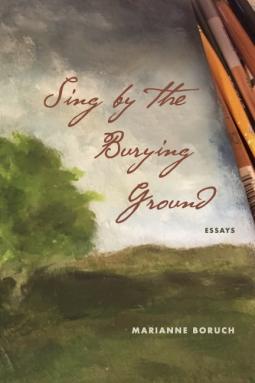
Sing by the Burying Ground
Essays
by Marianne Boruch
This title was previously available on NetGalley and is now archived.
Send NetGalley books directly to your Kindle or Kindle app
1
To read on a Kindle or Kindle app, please add kindle@netgalley.com as an approved email address to receive files in your Amazon account. Click here for step-by-step instructions.
2
Also find your Kindle email address within your Amazon account, and enter it here.
Pub Date Mar 15 2024 | Archive Date Jan 26 2024
Talking about this book? Use #SingbytheBuryingGround #NetGalley. More hashtag tips!
Description
Wallace Stevens aphroistically noted that “thought tends to collect in pools.” This sense of fluid, fateful, communion-seeking intellect undergirds the essays in Marianne Boruch’s Sing by the Burying Ground.
Here, the storied septuagenarian reflects on a lifetime of living in fellowship with verse. We delve into one of the first poems Boruch ever loved—“I was smitten straightaway and could not not read on,” she writes—from a largely forgotten Depression-era writer. We follow her on a pilgrimage to Roethke’s hometown of Saginaw, Michigan. We are entreated to consider the case for Dorothy Wordworth (the famous William’s sister) as poetry’s first Imagist working in English—thus beating Ezra Pound to the punch.
And, of course, each essay lives under the shadow of Emily Dickinson’s unnerving remark in her April 26, 1862 letter to Thomas Higginson, editor of the Atlantic, that her fate was to “sing, as a Boy does by the Burying Ground…” However dark, Boruch suggests, that fate can be a kind of luck, too.
Advance Praise
“[Boruch’s work] has the wonderful, commanding power of true attention: She sees and considers with intensity. Her poems often give fresh examples of how rare and thrilling it can be to notice.” —The Washington Post on Poems: New and Selected
“Boruch displays a quietly gymnastic intellect in the examinations of art, the body, and the human condition.” —American Poets Magazine on Cadaver, Speak
“Like Elizabeth Bishop, Boruch refuses to see more than there is in things — but her patience, her willingness to wait for the film of familiarity to slip, allows her to see what is there with a jeweler’s sense of facet and flaw.”—Poetry Magazine on Grace, Fallen From
Available Editions
| EDITION | Other Format |
| ISBN | 9780810146921 |
| PRICE | $20.00 (USD) |
| PAGES | 184 |



